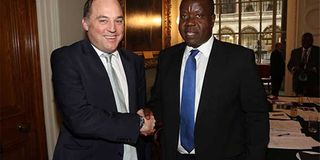Kenya-UK security cooperation yielding results, Matiang'i says

Interior CS Fred Matiang'i (right) with UK Minister of State for Security Ben Wallace after a UK-Kenya security dialogue meeting in London on March 7, 2019. Dr Matiang'i praised UK's support for counter-terrorism programmes in Kenya. PHOTO | COURTESY
What you need to know:
- Dr Matiang’i is the UK for a series of meetings with his British counterparts.
- Mr Wallace said there have been “productive discussions on counter-terrorism and serious organised crime”.
- The UK is one of Kenya’s allies in counter-terrorism programmes which have included training of Kenyan security forces.
Interior Cabinet Secretary Fred Matiang’i has said that Kenya has learnt beneficial lessons from the United Kingdom on how to handle security crises and minimising casualties.
Dr Matiang’i, who is in the UK for a series of meetings with his counterparts, said Kenyan security forces have been aided to foil several terror attacks after benefiting from a cooperation arrangement with UK authorities.
“The ministers said cooperation (between Kenya and United Kingdom) has led to successes ranging from improved response to security threats to bursting the smuggling (of) luxury SUVs through Mombasa,” a dispatch said after Dr Matiang’i met with UK Minister of State for Security Ben Wallace and Minister for Africa Harriet Baldwin.
DUSIT ATTACK
Dr Matiang’i cited the recent response to the DusitD2 terror attack in Nairobi in January, where, compared to previous incidents, security forces responded faster, saving lives of more than 700 people.
It turned out the UK has been offering lessons on how a multi-agency operation can save lives when they operate in an organised command structure.
Mr Wallace said there have been “productive discussions on counter-terrorism and serious organised crime” in the meeting dubbed ‘UK-Kenya security dialogue’.
“Kenya is a key partner in tackling these global challenges,” he wrote on Twitter.
COUNTER-TERRORISM
The UK is one of Kenya’s allies in counter-terrorism programmes which have included training of Kenyan security forces on disaster crisis management and other security response measures such as cyber security and investigations.
The meeting between Dr Matiang’i and the UK ministers came just two weeks after the British government announced the initial £30 million (Sh3.9 billion) funding for security and development projects in Africa.
Ms Baldwin announced in February that the projects form part of a programme to invest in the continent and strengthen relations with the African Union (AU).
The money is to be used in training peacekeepers in Kenya, assist in programmes for free and fair elections as well as focus on implementing the Continental Free Trade Area Agreement reached at the AU by member states meeting last year to improve intra-Africa business.
PM MAY'S PLEDGE
The funding was UK Prime Minister Theresa May’s pledge last August when she toured Nairobi. She pledged military support in war on terror and strengthened investments in what she said is ethical business dealings in Africa.
In Kenya, the British already run a military training centre in Nanyuki, called the British Army Training Unit in Kenya (Batuk).
In 2016, Kenya and the UK signed the new Defence Cooperation Agreement worth Sh7.5 billion a year and it consists of one of Britain’s largest military centres outside of the UK.
MILITARY TRAINING
British trainers routinely offer short-term military training to soldiers “to help build the capacity of national military forces, ensuring a number of states across Africa can respond appropriately and proportionally to the security threats they face, including terrorism, the illegal wildlife trade, violations of human rights and emerging humanitarian crises”.
Ms Baldwin said the funding will be disbursed over the next three years and will include programmes to tackle climate change and allow “the UK to support African-led ambitions with British expertise, to create more opportunities and more jobs”.





